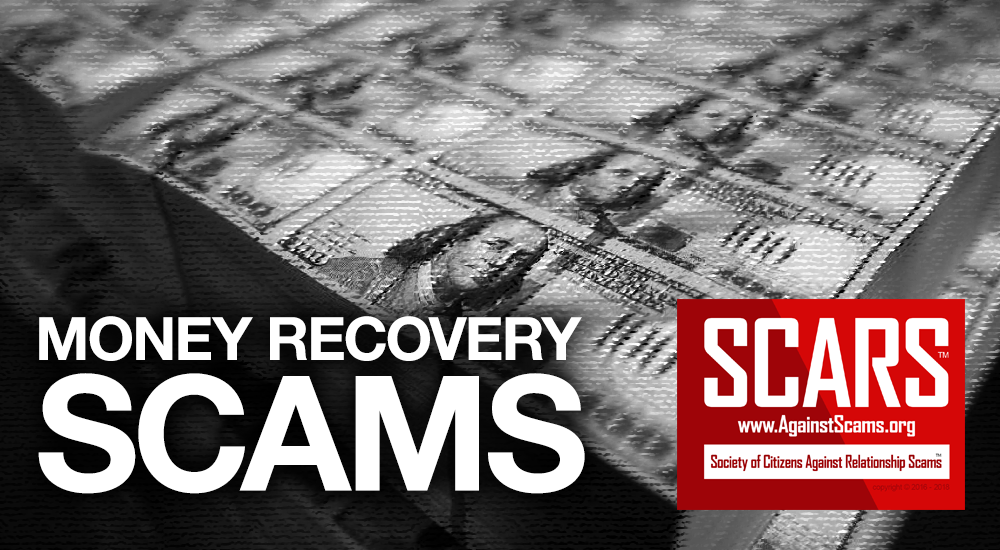
SCARS Institute’s Encyclopedia of Scams™ Published Continuously for 25 Years

After You Are Scammed The Scammers Come Out To Get You Again With Money Recovery Scams
They’re the worst of the worst: scams that target people who have already lost money to a scam. If you’ve been scammed, you may be targeted by a refund or recovery scam. In these scams, someone says they can help get your money back or recover the prize or item you never got, but you need to pay them first. If you do, you’ll lose more money.
How Refund and Recovery Scams Work
Whether it’s a refund scam promising to get your money back or a recovery scam claiming to get you the prize or products you were promised, the scheme usually follows a set pattern. Here’s how it happens:
- You’ve already been scammed. You may have given money to a phony charity, paid for a fake prize, or lost money is one of the many other ways scammers try to cheat you.
- Your name is on what scammers call a “sucker list.” Scammers keep and sell lists on the darkweb with information about people who have already lost money to fraud. It can include your name, address, phone number, the kind of scam that tricked you, and how much money you paid. Scammers buy, sell, and trade these lists, expecting that people who have been scammed once are good targets for being scammed again.
- Scammers come calling — again. Using a list of people who’ve already paid money to a scam, the scammer contacts you by phone, mail, or online. The pitch this time is that they’ll get back the money you lost or the prize or merchandise you never got. If you didn’t know you were scammed, no problem. The scammer, using the information they bought, can “helpfully” tell you about the earlier fraud. The information helps the scammer sound credible.
- They make you think you can trust them. The scammers may say they’re with a government agency, a consumer advocacy group, a law firm, a charity, or some other organization. Some even say they’re with the fake company that took your money, and they’re offering refunds to dissatisfied customers. They may say they’re holding money for you, offer to file complaint paperwork with government agencies on your behalf, or claim they can get your name at the top of a list for reimbursement. Whatever they say, it’s a lie, designed to gain your trust — and your money.
- You’re told you need to pay. The scammers promise to recover your money or merchandise, but they need you to pay them or give them financial information first. They may call the upfront money a “retainer fee,” “processing fee,” “administrative charge,” “tax,” “shipment and handling charge,” or even a “donation” to a charity they name. Or, they may say they need your checking, debit, or another financial account number so they can deposit a refund directly into your account. If you give them the requested fee or account information, your money will disappear.
How To Recognize Refund and Recovery Scams
- Scammers contact you and ask for an upfront fee. No matter how someone contacts you — by mail, online, telephone, or text message — it’s never a good idea to pay upfront, especially when someone contacts you out of the blue. And, telemarketers selling recovery services can’t ask for or accept payment until seven business days after they deliver the money or the item they recovered to you because it’s against the law.
- Scammers say they’re from a government agency, nonprofit group, or some other organization, and need payment or your personal information. Government agencies and legitimate organizations won’t ask for money to help you get a refund. They will never ask for your financial account numbers or other personal information and will not guarantee that you’ll get your money back. Anyone who does any of these things is a scammer.
How To Avoid Refund and Recovery Scams
- Don’t trust calls, letters, emails, or messages on social media from someone who says they can recover money you lost in a scam for a fee. You’ll lose more money.
- Never pay upfront for a refund or help with a refund. That means, never give your bank account, credit card, or other payment information to get a refund. Anyone who asks for your financial information or for upfront fees is a scammer.
- Know that only scammers will tell you to pay by gift card, cryptocurrency, or bank wire transfer through companies like Western Union or MoneyGram or Zelle. Anyone who asks you to pay in any of these ways is a scammer.
- Be suspicious if you get a supposed refund check for more money than you lost. Some scammers will say there was an error and tell you to cash the check, keep the amount you’re due, and return the balance. It can take weeks for a bank to discover that a check that it advanced was a fake. In the meantime, if you use the money, even to return some to the scammer, the bank will want you to repay all that money.
- Research any organizations or government agencies that contact you. For organizations or companies, search for the name online, with words like “complaint,” “scam,” or “review.” Check with your state attorney general, too, to see if other people have complained about the organization. For government agencies, look up their number on your own. Then call to confirm that they contacted you. Don’t call a number that a caller gave you.
What To Do If You Already Paid To Get a Refund
Scammers often ask you to pay in ways that make it tough to get your money back. If you’ve paid a scammer, the sooner you act, the better. Here are some steps to try to stop a transaction, get a transaction reversed, or get a refund.
Report Refund and Recovery Scams
If you’ve lost money to a refund or recovery scam, or have information about the company or scammer who called you, report it
- Always report these crimes to your local police – they may have options available and you need the report number when reporting this to your bank
- Report to the FTC at https://reportfraud.ftc.gov/#/?orgcode=SCARS
- Report to your state attorney general’s office or national prosecutors office – they may help you directly or refer you ban to your police
- You can also report these to the FBI at www.IC3.gov or 1-800-CALL-FBI
- And you can report these on www.Anyscam.com
When you report these crimes, you help law enforcement stop them and alert others in your community to the scam.
-/ 30 /-
What do you think about this?
Please share your thoughts in a comment below!
LEAVE A COMMENT?
Thank you for your comment. You may receive an email to follow up. We never share your data with marketers.
Recent Comments
On Other Articles
- on Love Bombing And How Romance Scam Victims Are Forced To Feel: “I was love bombed to the point that I would do just about anything for the scammer(s). I was told…” Feb 11, 14:24
- on Dani Daniels (Kira Lee Orsag): Another Scammer’s Favorite: “You provide a valuable service! I wish more people knew about it!” Feb 10, 15:05
- on Danielle Delaunay/Danielle Genevieve – Stolen Identity/Stolen Photos – Impersonation Victim UPDATED 2024: “We highly recommend that you simply turn away form the scam and scammers, and focus on the development of a…” Feb 4, 19:47
- on The Art Of Deception: The Fundamental Principals Of Successful Deceptions – 2024: “I experienced many of the deceptive tactics that romance scammers use. I was told various stories of hardship and why…” Feb 4, 15:27
- on Danielle Delaunay/Danielle Genevieve – Stolen Identity/Stolen Photos – Impersonation Victim UPDATED 2024: “Yes, I’m in that exact situation also. “Danielle” has seriously scammed me for 3 years now. “She” (he) doesn’t know…” Feb 4, 14:58
- on An Essay on Justice and Money Recovery – 2026: “you are so right I accidentally clicked on online justice I signed an agreement for 12k upfront but cd only…” Feb 3, 08:16
- on The SCARS Institute Top 50 Celebrity Impersonation Scams – 2025: “Quora has had visits from scammers pretending to be Keanu Reeves and Paul McCartney in 2025 and 2026.” Jan 27, 17:45
- on Scam Victims Should Limit Their Exposure To Scam News & Scammer Photos: “I used to look at scammers photos all the time; however, I don’t feel the need to do it anymore.…” Jan 26, 23:19
- on After A Scam, No One Can Tell You How You Will React: “This article was very informative, my scams happened 5 years ago; however, l do remember several of those emotions and/or…” Jan 23, 17:17
- on Situational Awareness and How Trauma Makes Scam Victims Less Safe – 2024: “I need to be more observant and I am practicing situational awareness. I’m saving this article to remind me of…” Jan 21, 22:55
ARTICLE META
Important Information for New Scam Victims
- Please visit www.ScamVictimsSupport.org – a SCARS Website for New Scam Victims & Sextortion Victims
- Enroll in FREE SCARS Scam Survivor’s School now at www.SCARSeducation.org
- Please visit www.ScamPsychology.org – to more fully understand the psychological concepts involved in scams and scam victim recovery
If you are looking for local trauma counselors please visit counseling.AgainstScams.org or join SCARS for our counseling/therapy benefit: membership.AgainstScams.org
If you need to speak with someone now, you can dial 988 or find phone numbers for crisis hotlines all around the world here: www.opencounseling.com/suicide-hotlines
A Note About Labeling!
We often use the term ‘scam victim’ in our articles, but this is a convenience to help those searching for information in search engines like Google. It is just a convenience and has no deeper meaning. If you have come through such an experience, YOU are a Survivor! It was not your fault. You are not alone! Axios!
A Question of Trust
At the SCARS Institute, we invite you to do your own research on the topics we speak about and publish, Our team investigates the subject being discussed, especially when it comes to understanding the scam victims-survivors experience. You can do Google searches but in many cases, you will have to wade through scientific papers and studies. However, remember that biases and perspectives matter and influence the outcome. Regardless, we encourage you to explore these topics as thoroughly as you can for your own awareness.
Statement About Victim Blaming
SCARS Institute articles examine different aspects of the scam victim experience, as well as those who may have been secondary victims. This work focuses on understanding victimization through the science of victimology, including common psychological and behavioral responses. The purpose is to help victims and survivors understand why these crimes occurred, reduce shame and self-blame, strengthen recovery programs and victim opportunities, and lower the risk of future victimization.
At times, these discussions may sound uncomfortable, overwhelming, or may be mistaken for blame. They are not. Scam victims are never blamed. Our goal is to explain the mechanisms of deception and the human responses that scammers exploit, and the processes that occur after the scam ends, so victims can better understand what happened to them and why it felt convincing at the time, and what the path looks like going forward.
Articles that address the psychology, neurology, physiology, and other characteristics of scams and the victim experience recognize that all people share cognitive and emotional traits that can be manipulated under the right conditions. These characteristics are not flaws. They are normal human functions that criminals deliberately exploit. Victims typically have little awareness of these mechanisms while a scam is unfolding and a very limited ability to control them. Awareness often comes only after the harm has occurred.
By explaining these processes, these articles help victims make sense of their experiences, understand common post-scam reactions, and identify ways to protect themselves moving forward. This knowledge supports recovery by replacing confusion and self-blame with clarity, context, and self-compassion.
Additional educational material on these topics is available at ScamPsychology.org – ScamsNOW.com and other SCARS Institute websites.
Psychology Disclaimer:
All articles about psychology and the human brain on this website are for information & education only
The information provided in this article is intended for educational and self-help purposes only and should not be construed as a substitute for professional therapy or counseling.
While any self-help techniques outlined herein may be beneficial for scam victims seeking to recover from their experience and move towards recovery, it is important to consult with a qualified mental health professional before initiating any course of action. Each individual’s experience and needs are unique, and what works for one person may not be suitable for another.
Additionally, any approach may not be appropriate for individuals with certain pre-existing mental health conditions or trauma histories. It is advisable to seek guidance from a licensed therapist or counselor who can provide personalized support, guidance, and treatment tailored to your specific needs.
If you are experiencing significant distress or emotional difficulties related to a scam or other traumatic event, please consult your doctor or mental health provider for appropriate care and support.
Also read our SCARS Institute Statement about Professional Care for Scam Victims – click here to go to our ScamsNOW.com website.
















I’m pretty sure I ended up on the “suckers list “. I had several strangers contacting me that I just ignored.
Very informative!